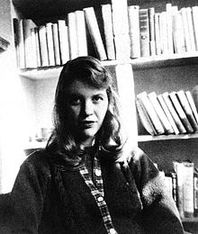 by Yoon Joung Lee American poet and novelist, Sylvia Plath, was born in 1932 in Boston, Massachusetts to middle class parents. Her father, Otto Plath, was a professor of biology at Boston University and a well-known expert on bees. When she was eight in 1940, her father died from untreated diabetes. She was letft with feelings of guilt, grief and anger, and those feelings led her to create most of her works. She was a girl who compelled toward perfection in everything she attempted. She was popular among peers at school, and she always earned straight A’s and won the best prizes. In 1950, she entered Smith College in Northhampton, Massachusetts, on a scholarship. There, she again excelled in her studies academically and socially. She was teacher and peers’ favorite. While at Smith she wrote over four hundreds poems. In 1952, she earned an opportunity to work as a guest editor at Mademoiselle magazine in New York City after she won their fiction contest. However, her life in NYC was depressing for her and later her famous work The Bell Jar was written based on her NYC life. Such depression led her to attempt to kill herself by swallowing sleeping pills. She survived and was treated with electroshock and psychotherapy. Later, she went back to Smith from 1957 to 1958 and achieved academic and literary success. She graduated from Smith with honors and won a Fullbright scholarship to study at Cambridge, England. In 1956, she married Ted Hughes, an English poet and she published her first book, The Colossus in England when she was 28. In The Colossus, she showed a clear dedication with which she pursued her apprenticeship. In early 1961, she began writing more poems. She and her husband, Hughes, settled for a short period of time in Devon, England, but they divorced in 1963 two years after their first child was born. By the time of their divorce, she was ill and low on money but had two small children to take care of in their small apartment in London, England during the coldest winter in years. She was living on the edge of another breakdown. In 1963, she killed herself with cooking gas. She was only 30. The last things she left for her children were two mugs of milk and a plate of buttered bread. Two years after her death, a collection of some of her last poems, Ariel, was published. These published poems were edited by none other than Ted Hughes. 10/14/2012 11:57:07 pm
It amazes me that so many men do not care if their children have food on the table.Along with making it a little easier for a mother to provide for her children.God bless Comments are closed.
|
Archives
July 2017
Categories
All
|
 RSS Feed
RSS Feed